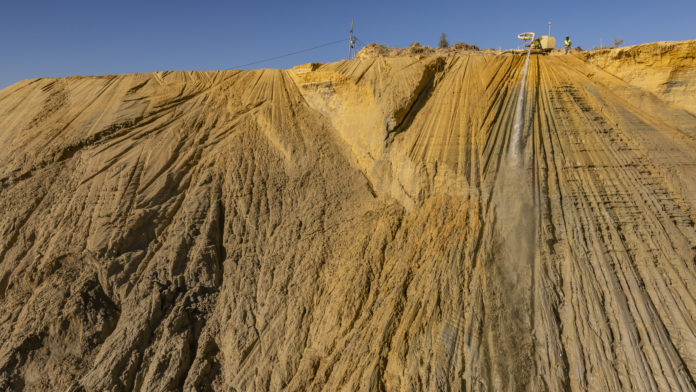
DRDGOLD remained on course to pay a year-end dividend despite a slump in third quarter earnings quarter-on-quarter which was a consequence of lower gold production.
DRDGOLD processes gold tailings at its Ergo plant, east of Johannesburg, and the gold tailings near the West Rand facilities of Sibanye-Stillwater’s Kloof and Driefontein mines, known as Far West Gold Recoveries (FWGR).
Gold production for the period of 1,382 kilograms (64,621 ounces) represented a 6% decline and was owing to a heavy fall in yield. Gold sold during the three months was 8% lower than in the second quarter of DRDGOLD’s financial year.
Coupled with a lower price received – down 9% to R857,895 per kilogram – adjusted earnings before interest, tax, depreciation and amortisation (EBITDA) fell 35% to R317.7m quarter-on-quarter.
Cash and cash equivalents fell R3.7m to R2,2bn as of 31 March 2021 after the interim dividend of R341.8m was paid for the six months ended December 31. DRDGOLD does not have any external borrowings.
The first port of call for cash generated in the quarter would be the firm’s capital expenditure programme, largely associated with the second phase roll-out of FWGR, the company said.
However, it had no intention of breaking its dividend track-record.
“Even with this planned capital expenditure, and unless an unforeseen event takes place, the company anticipates declaring a final dividend in August 2021, to maintain its 14-year unbroken run of dividends paid,” it said today.
In February, DRDGOLD declared an interim dividend of 40c a share which was 60% up on the 25c declared for the six months to end-December 2019.
Its commitment to dividend payments is also partly informed by a conservative attitude towards capital expansion. DRDGOLD CEO, Niël Pretorius, has previously expressed reservations about South Africa’s regulatory and political environment, saying that national issues acted like “a capital filter”.
“What does a model look like that could accommodate everything on the Far West Rand?,” he said in February referring to the firm’s FWGR expansion. “We could have a much longer life with much broader participation which would also have a far more profound impact in terms of environmental clean-up,” he said.
“We have to look at the relative attractiveness of the country in terms of issues such as the rule of law and the sanctity of our courts,” he said.
“Are we on the right track? Bringing about black empowerment is so vitally important, but are we pursuing something that is just not working except for a very select few?
“It may be necessary to revisit some of those policies,” he said.
A High Court hearing is currently underway in which the Minerals Council South Africa is attempting to get a positive ruling on the ‘once-empowered, always-empowered’ regulation in the third iteration of the South African government’s Mining Charter.
If Government wins the hearing, mining companies will be required to conduct new empowerment transactions in the event of a transfer of a mining licence.










